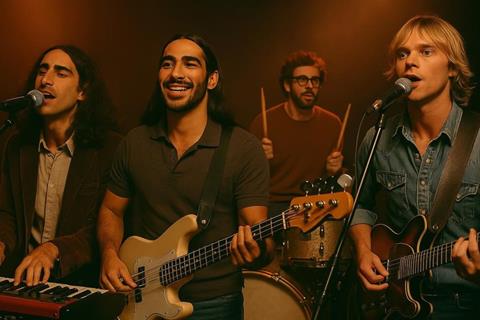The hottest new band on the scene, The Velvet Sundown, was drawing millions of streams before listeners realised every note and lyric had been composed by artificial intelligence. Jermaine Dallas considers what the trend could mean for writers of worship music

If the goal of Christian music is to reach the masses, you could argue we’re in a golden age. Yet, why does the very essence of creativity feel so jeopardised in this era of instant outputs?
With the tools available to us today, it’s never been easier to fulfil the Great Commission through music. The gospel message is a global one – meant to be spread far and wide (see Matthew 28).
Streaming platforms and online distribution channels have democratised publishing, getting music directly to listeners. Generative artificial intelligence (AI) is also changing the game, offering us superpowers to enhance the creativity we already have – or so the theory goes.
I was taken aback by the success of The Velvet Sundown, the fully AI-generated band that has received millions of plays on Spotify and attracted global attention.
Everything about the band – from its visuals to the music itself – is machine-made, presumably with minimal human input. Global reach with creative detachment.
Could the same happen in Christian music, and what effect would it have?
Writing with robots
We could soon see a world where music is God-breathed but AI-created – where artists (or even non-artists) prompt an AI to create a song based on the scriptures and/or a message they believe they’ve received from God. Without the friction of recording or production, the song could be released and heard within minutes.
But as Paul writes in 1 Corinthians 10:23, “All things are lawful,” but not all things are helpful” (ESV). Just because it’s possible doesn’t mean we should have carte blanche to do it.
Music created by humans for humans – when rooted in faith – will always carry a unique power that AI can’t replicate.
I struggle to picture the psalmist David using ChatGPT to write worship music, even if it had been available to him. And that’s the tension at the heart of this conversation.
For Christians, songwriting carries spiritual and emotional weight. It’s infused with – and inspired by – human testimony.
I grew up singing traditional hymns in church, and many of my favourites, such as ‘It Is Well with My Soul’, were born out of deeply personal experiences. Can AI genuinely replicate the Spirit-led, often vulnerable process that defines so many beloved Christian songs? I don’t think it can.
Data, data everywhere
Generative AI isn’t the only tool threatening to upend Christian creativity. Streaming platforms are brilliant at delivering music to the masses, but they can also tempt artists to create music that drives clicks.
I remember hearing from UK gospel artist CalledOut Music – who recently signed with Integrity Music – about this issue early in his career. He said that artists now have so much data on how each song performs that it’s easy to replicate what made a hit successful the first time around. He makes a conscious effort not to be beholden to the data, but the temptation to create identikit music is strong. Songs that echo past successes might reach wide audiences – but often at the cost of creative originality.
I struggle to picture the psalmist David using ChatGPT to write worship music, even if it had been available to him
Not only does this trend risk producing boring music, it also presents a bigger problem: idolising metrics over message.
Ecclesiastes 3:1–11 reminds us of the importance of seasons – that there is a time for everything. God’s timing and voice may not always align with what’s currently trending.
Safe isn’t always sacred
We want our music to resonate with as many people as possible – but never at the expense of God-given creativity. It’s easier than ever to make and release music, but Christian music should never be safe and soulless, stripped of originality or divine spark.
Maybe I’m optimistic to a fault, but I don’t believe Christian music should aim to be merely palatable or commercially viable. That’s the kind of content that might as well be made by machines. There’s deep value in artistic risk – in the prophetic voice that provokes, heals, and transforms.
Creativity isn’t just a means to an end – it’s a spiritual response to divine inspiration.
Christian music should prioritise obedience to God’s prompting over market potential. Though tools and trends will continue to evolve, the purpose must stay rooted in authenticity and true ‘spirit and truth’ worship (John 4:24).
I’m more of a technology enthusiast than I am a luddite. But there are areas in life where we must be led by the Spirit. Music created by humans for humans – when rooted in faith – will always carry a unique power that AI can’t replicate.
We need to safeguard our creativity and stay mindful of the responsibility we carry as Christian artists and creatives: to write songs and craft art that is genuine, spiritually resonant, and reflective of the human experience.

































